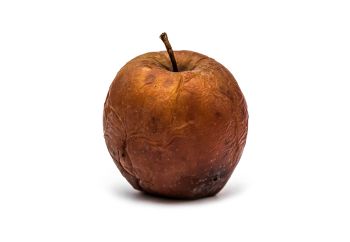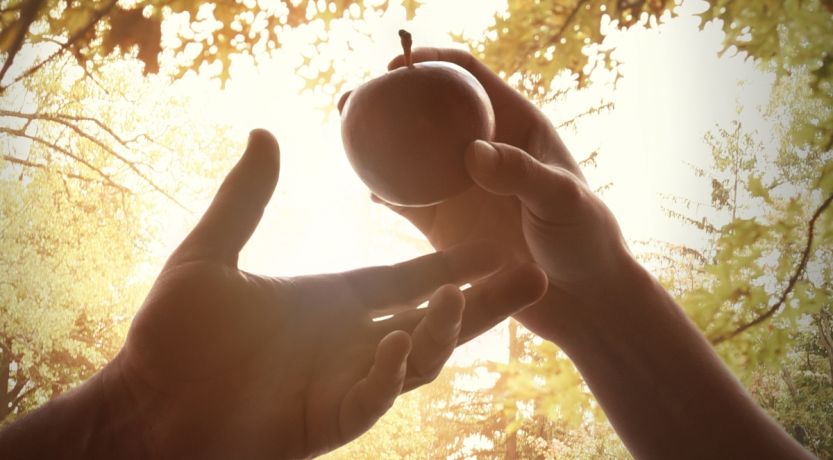How we define words like good and evil or right and wrong will define how we live our lives. How can we arrive at a definition that works?
“Of every tree of the garden you may freely eat; but of the tree of the knowledge of good and evil you shall not eat, for in the day that you eat of it you shall surely die” (Genesis 2:16-17).
That was it.
That was the first rule God is recorded as giving our first parents.
Adam and Eve lived in a literal paradise, and to keep on living there, they had to keep their hands off of one tree.
One. Measly. Tree.
But it was tempting. It wasn’t just any tree—it was the tree of the knowledge of good and evil. And when Satan, “that serpent of old … who deceives the whole world” (Revelation 12:9), promised that the tree would make them “like God, knowing good and evil” (Genesis 3:5), they gave in to that temptation and ate the forbidden fruit.
The rest, as they say, is history.
A decision
Some people read the story of the Garden of Eden and wonder why God wanted to deny Adam and Eve access to knowledge. That was the angle Satan took in his deception: “In the day you eat of it your eyes will be opened” (Genesis 3:5, emphasis added throughout). God’s holding out on you, he was telling them. He wants to keep you in the dark. He wants you to stay ignorant.
But is that really what happened?
The tree of the knowledge of good and evil represented a choice. It’s the same basic choice humanity has faced ever since. We can trust God to show us the difference between right and wrong, or we can try to sort that difference out for ourselves. By eating the forbidden fruit, Adam and Eve opted to sort it out for themselves—and for the past 6,000 years, the human race has been following in their footsteps.
Doing vs. defining
A few years ago, the Secular Student Alliance launched a bus ad campaign. One of those ads read, “Second richest person in the world. Donated over $26 billion to charity. Bill Gates is Good without god. Are you?”
The ad campaign itself was built around a deeper philosophical question, namely: “Can people do good things without believing in God?” And the answer is …
Yes.
Of course.
Absolutely.
It happens all the time. There are atheists who do wonderfully good things, and there are believers who do terribly evil things. Believing—or not believing—in God doesn’t take away your ability to do good or evil.
But resting underneath this discussion is another, far more difficult question:
Can you define good without God?
Sounds good to me
We’ve been trying. For a long, long time now, philosophers and religions have debated and argued over the meanings of words like good and evil, right and wrong. And that’s a symptom of the problem—sure, a person can do good things without God, but how can we know for sure what things are good?
It sounds like a matter of semantics, but this is important. How can we tell the difference between good and evil?
Well, maybe it’s an intuitive thing. Maybe we just know good when we see it.
Except … what happens if someone else defines good and evil differently? Who’s right? How can we be sure?
So then maybe it’s something defined by the majority. Maybe something is good when enough people recognize it as good.
But then … what about the Holocaust? If the Nazis had won World War II and convinced enough people that the Jews and other minorities were inferior forms of life, would that make the Holocaust good? Surely not. The Holocaust was evil and wrong, no matter how many people say otherwise.
Then maybe it’s tied to biology. Some evolutionists claim morals are an evolutionary byproduct; that we invented them to help us advance as a species.
If that’s true, how exactly do values like self-sacrifice factor into the survival of the fittest?
Okay, so maybe good and evil just exist somehow as concepts rooted in something bigger than us. All philosophers can do is argue their opinions and observations—even scientists can’t point to a law that defines good and evil the way they can point to a law that explains the trajectory of a baseball or the speed of light in a vacuum.
So how can we define good and evil?
Finding the standard

Here’s the big secret: the Garden of Eden wasn’t really about who gets to know good and evil. It was about who gets to define good and evil. The question on the table was, “Who knows best?” Adam and Eve bet on themselves, and in the years since then, it’s become painfully obvious:
Without God, we have no objective standard. And without an objective standard, we have no definitive way to say, “This is right and this is wrong.” Instead, we have opinions. Best guesses. Shots in the dark.
But to walk with God, we have to be willing to do what Adam and Eve weren’t. We have to be willing to trust that He knows better.
As a human, that can be tough. It can be a little grating to have “because God said so” as our reason for doing something. We tend to want more—an explanation, an insight, a detailed breakdown of cause and effect. Sometimes God gives us those explanations—and sometimes He doesn’t. Sometimes we may not even agree with what God expects of us. And in those moments, it’s not always easy to accept His decision. After all, why should God get to label what’s right and wrong?
And the answer—the obvious answer, the one staring us in the face, the one we don’t always like to admit—is, “Because He’s God.”
Because He is the immortal, eternal, unchanging God, unbound by time and space. Because His character is love, and His standards are never arbitrary but are designed for the benefit of all. Because He has a perfect understanding of everything that has ever happened or could ever happen. Because He knows the infinite complexities of the inner workings of our lives in a way we can’t begin to comprehend.
If good and evil exist in our universe, then God is the One best equipped to understand and explain those concepts, because He created the universe.
And within that universe, we humans seem to come equipped with a sense of right and wrong, fair and unfair, just and unjust. We’re attuned to things like double standards and hypocrisy. But why? How did we end up with all those senses, and how can we fine-tune them to be more accurate?
Calibration required
God created humans with a conscience. It is shaped by our parents and our society. Whether or not we ever come to know Him and His perfect law, that conscience develops some sense of right and wrong. Most of us feel guilty when we lie. Murder is a shocking, unsettling thought. We feel good about helping someone else out.
Something inside us feels strongly about these things, and we tend to label those strong feelings as either “right” or “wrong.”
“There is a way that seems right to a man, but its end is the way of death.”
But our conscience is imperfect. The Bible warns, “There is a way that seems right to a man, but its end is the way of death” (Proverbs 14:12) and, “The heart is deceitful above all things, and desperately wicked; who can know it?” (Jeremiah 17:9). Our conscience has to be educated, and it is easily corrupted, deceived and ignored. It’s a mechanism for sorting out right and wrong, but it needs calibrating.
After communicating God’s instructions to the Israelites, Moses explained that “the commandments of the LORD and His statutes” were “for your good” (Deuteronomy 10:13). Nothing about God’s laws is arbitrary—those instructions contain the keys to both knowing and doing good.
The more we learn and follow those laws, the more we calibrate our consciences. When we choose to stop figuratively eating from the tree of the knowledge of good and evil—when we choose to let God show us the difference between good and evil instead of trying to sort it out for ourselves—then we can turn to the pages of the Bible and find the discernment we need.
When we couple that with the Holy Spirit God offers us (2 Timothy 1:6), we begin to develop some insight into the very mind of God Himself. We can start to see not only what things are good and evil, but why those things are good and evil. With God as our guide, we can make the decisions that lead to a happier, more fulfilling life.
Good with God
It’s true—you can do good things without God. Anyone can, and many do.
But doing good things and being good—truly understanding goodness and integrating it into our character—are two different things.
If we follow in the footsteps of Adam and Eve by trying to figure things out on our own, we’re going to get some things right—but we’re also going to get some things wrong. Really wrong. And the worst part is, we won’t always know the difference until it’s too late.
Jesus explained, “No one is good but One, that is, God” (Matthew 19:17). When we live our lives apart from His standards, the best we can do is guess, and guessing isn’t enough. We can’t truly be good without God because God alone is good.
You can do good things without God, but you’ll be forever falling short of your true potential, missing out on the very reason you were created.
The truth is, going through life with God—trusting in His guidance and letting Him show us the way forward—is about so much more than just being good. It’s about being so much better than we could ever be on our own.
To learn more about the values God calls good and how they’ll one day change the world, read our article “Christian Values.”






